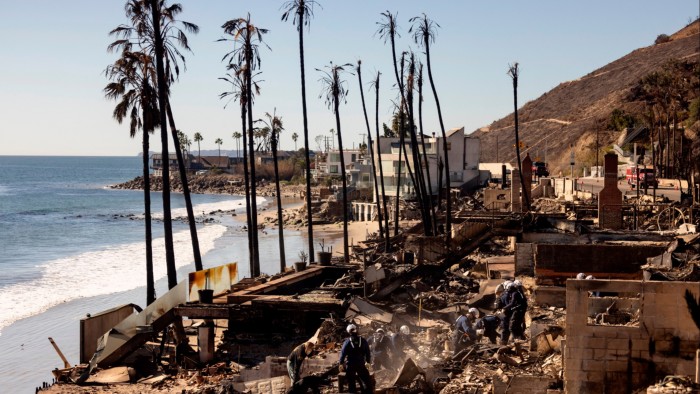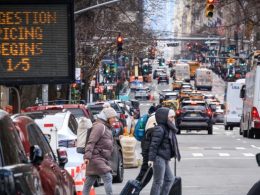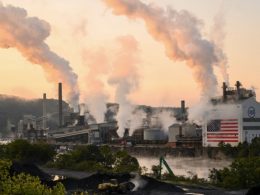Two days before devastating fires broke out in Los Angeles, Hollywood was in a celebratory mood as Demi Moore, Zendaya and Timothée Chalamet walked the red carpet outside the Golden Globe Awards.
At the glitzy parties afterwards, there was excited chatter about the success of Wicked and other recent hits — and whether they might augur the end of a deep Hollywood slump marked by studio budget cuts, writer and actor strikes and declining box office takes.
A week later, Los Angeles’ most-celebrated industry was in shock and again uncertain about its prospects for recovery. “I don’t think anyone knows what’s next,” said an executive at a major film studio. “This town is going through a lot of whiplash.”
Studios in Hollywood, including Sony, Disney and Warner Bros, have not sustained damage from the fires, but they have halted shooting on many productions since the wind-whipped fires began spreading into densely-populated neighbourhoods.
On the Sony lot in Culver City, new episodes of long-running game shows Jeopardy and Wheel of Fortune have been suspended. NBCUniversal last week postponed shoots of several television shows, including the Golden Globe-winning comedy Hacks, but resumed filming this week. Other studios say they are monitoring the blazes and expect to be up and running soon.
Preparations for the Oscars, Hollywood’s biggest night, have also been affected by the fires. The Academy of Motion Picture Arts and Sciences has twice extended the voting period for nominations for the Oscars, which are due to be broadcast on March 2, to give members more time to consider their choices. The Academy took the extra step of cancelling a star-studded luncheon for nominees planned for next month.
Executives think these fire-related interruptions will be temporary, but there are longer-term concerns that Hollywood is losing its allure as a place to make movies and TV. Once the world leader in production, LA has watched as other US states, along with Canada and the UK, have used tax incentives to peel off business from California.
The result has been sharp declines in film and TV productions in Southern California over the past five years, said Philip Sokoloski, a spokesperson for FilmLA, a group that hands out permits for productions in LA.
He said the number of productions in LA has fallen by double digit amounts in every category that his company tracks over the past five years. “In some cases, it’s like 50 per cent,” he added.
Gavin Newsom, California’s governor, will try to revive the state’s film industry this year — even as he also commits billions of dollars to help LA recover from the fires. He is planning to introduce a $750mn annual tax incentive plan for the industry in the upcoming session in the state’s legislature, more than double the current level.
The goal is to lure back productions that have moved to Georgia, Louisiana, New York and other US states with more generous incentives — and try to head off defections to Canada and the UK. If approved, the incentive package would go into effect in July.
At stake is an industry that generates close to $45bn in earnings each year for California. At the height of the streaming bubble, LA employed 149,500 people in the motion picture and sound recording industries, according to the Bureau of Labor Statistics. By 2023, when strikes brought production to a near-standstill, the figure dropped to 108,740.
The post-strike rebound many in the industry expected last year did not materialise, with filming sometimes dropping below levels seen during the labour stoppages. Reality TV programming, usually a reliable employer during lean periods, dried up. Stories circulated of Hollywood workers who have been forced to sell their homes, become Uber drivers or leave the industry altogether. The phrase “Survive til 2025” became a mantra for struggling actors, directors and writers.
“Then 2025 comes and a hellscape is unleashed,” said Tom Nunan, an Oscar-winning producer and film professor at UCLA. “I don’t think the fires are really going to change the direction of the industry, but it’s definitely a tipping point for people [to consider leaving LA]. People are sick and tired of waiting for the studios to give them work.”
The fear is LA’s 100-year-old ecosystem of writers, actors, producers, crew and agents could begin to fray.
Sokoloski of FilmLA said: “When you look at the people who’ve had solid careers here who are considering relocating out of the state to chase work or pursue a new line of work entirely, it says something about the faith and confidence people have in this region.”
“When people begin to consider the potential to forge their careers elsewhere that’s certainly not to our benefit,” he added.
Hollywood has cheered Newsom’s proposal, though some warn it will not be a magic bullet. British Columbia raised its tax credits on January 1, with extra incentives for productions above $200mn. The credits, combined with the weakening of the Canadian dollar and its strong production infrastructure, makes Canada an attractive alternative to California, LA-based Entertainment Partners said in a December report.
The group also noted president-elect Donald Trump’s proposed 25 per cent tariffs on Canada could hurt US film and TV production.
For now, the focus in LA is on aiding the rescue and rebuilding efforts. Hollywood studios have donated millions of dollars to emergency response and rebuilding efforts, and actors including Jamie Lee Curtis have been leading fundraisers for those displaced by the fires.
But rebuilding faith in Hollywood’s status as the home of the world’s “dream factories” is also going to take work. “I’ve been working in the business since 1984, and I’ve never seen such a prolonged period of despair,” Nunan said. “It kicked off with Covid, then the streaming wars, then the strikes and now this.”
But the 62-year-old Hollywood veteran added: “I’m not ready to quit. I’m not ready to give up.”
Source link









